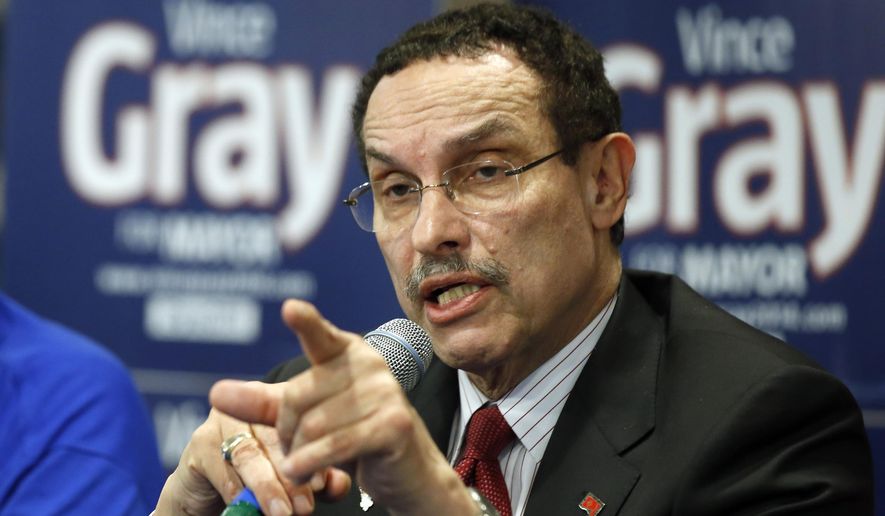Conservative groups are riled over the D.C. Council’s passage of a new anti-discrimination law they say would illegally require organizations to provide insurance coverage of abortions and other reproductive health care procedures regardless of whether they violate the organizations’ religious beliefs.
Alliance Defending Freedom, a conservative Christian legal group, is asking Mayor Vincent C. Gray to veto the bill passed last week on grounds that even he recognized the bill might violate protections afforded under the Constitution and the federal Religious Freedom Restoration Act (RFRA).
ADF senior counsel Casey Mattox said he interprets the language of the bill to mean that organizations would have to include coverage of reproductive health care drugs and procedures like birth control pills or elective abortions even if an organization is religiously opposed to such procedures. He expects ADF would likely sue the city if the law is allowed to take effect.
“Every employer in the District would have to cover every single reproductive health decision, including elective abortions, regardless of who is on staff,” Mr. Mattox said. “You basically have to cover everything from the outset to make sure you were in compliance with the law in case anything came up.”
Mr. Mattox, who testified against the bill at hearings earlier this year, said the law could also extend to hiring practices, blocking for example, a pro-life group from stating in an advertisement for a job that the group was looking to hire someone with pro-life beliefs.
The bill bans an employer from discriminating against an employee based on “the individual’s or a dependent’s reproductive health decision making, including a decision to use or access a particular drug, device or medical service, because of or on the basis of an employer’s personal beliefs about such services.”
SEE ALSO: Retired jail officers sue D.C. for right to carry guns for protection
Mr. Gray put the D.C. Council on notice ahead of their vote to adopt the Reproductive Health Non-Discrimination Amendment Act of 2014, calling the bill “legally problematic” and citing concerns raised by Office of the Attorney General.
“Religious organizations, religiously-affiliated organizations, religiously-driven for-profit entities, and political organizations may have strong First Amendment and RFRA grounds for challenging the law’s applicability to them,” Mr. Gray wrote in a letter to the council outlining his concerns about the legislation. “If the Council wishes to adopt this Bill or similar legislation, it should clarify the Human Rights Act’s existing exemption for religious and political organizations to ensure that the exemption protects the religious and political liberty interests that the First Amendment and the RFRA are designed to secure.”
While the council did adopt amendments that would make the bill applicable to both men and women, averting legal concerns that the original version only applied to women’s reproductive health decisions, it did not address the issue regarding exemptions for religious employers.
A spokeswoman for Mr. Gray said the mayor has asked the Office of the Attorney General to review the bill in order to determine any possible next steps — actions that could include a veto.
The council unanimously adopted the measure, meaning Mr. Gray would have to convince some members to drop support of the bill in order for a veto not to be overridden.
In his introduction of the bill in May, D.C. Council member David Grosso said he hoped the law would prevent employers from retaliating against employees for their reproductive health care decisions.
SEE ALSO: Alan Dershowitz sees political double standard in vandal attack on U.Va. fraternity house
“For example, in Wisconsin, after the state legislature passed a law requiring insurance plans to cover contraception, the Catholic diocese told employees that if they used the benefit, they would be fired,” Mr. Grosso, at large independent, said at the time. “In the past four years alone, individuals in California, Texas, Montana, and Indiana have brought discrimination suits against their employers after being fired from their jobs for being pregnant without being married.”
Council staffers say that the bill was designed to provide protections for employees, for example so that an employer could not fire a female employee because she got pregnant. But the bill intentionally shied away from delving into territory they regarding health insurance coverage requirements, said Ben Shelton, legislative counsel for the council’s judiciary committee, which vetted the bill.
“It’s adding to that list of reproductive health choices, saying you can’t terminate somebody because they’ve taken the Plan B pill or something like that,” said Mr. Shelton, referring to a brand of emergency contraception. “It’s designed not to say what types of insurance an employer must offer. We did not design this bill to speak to those issues at all.”
• Andrea Noble can be reached at anoble@washingtontimes.com.




Please read our comment policy before commenting.